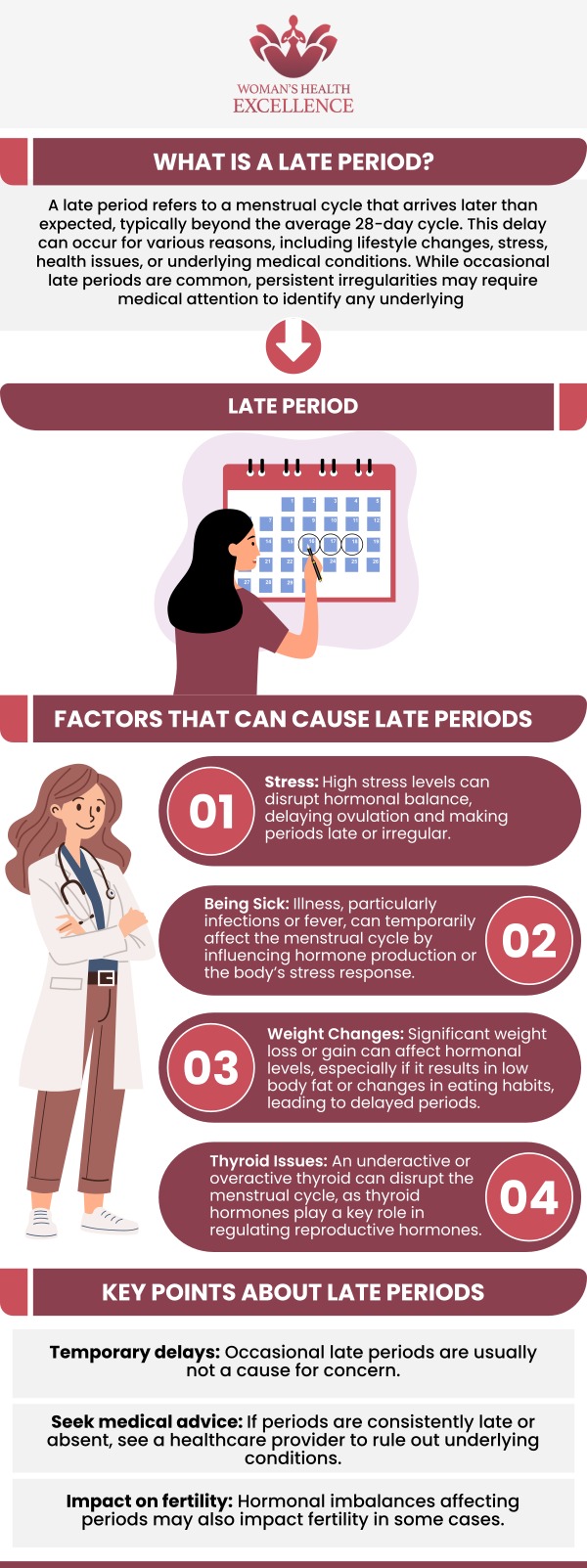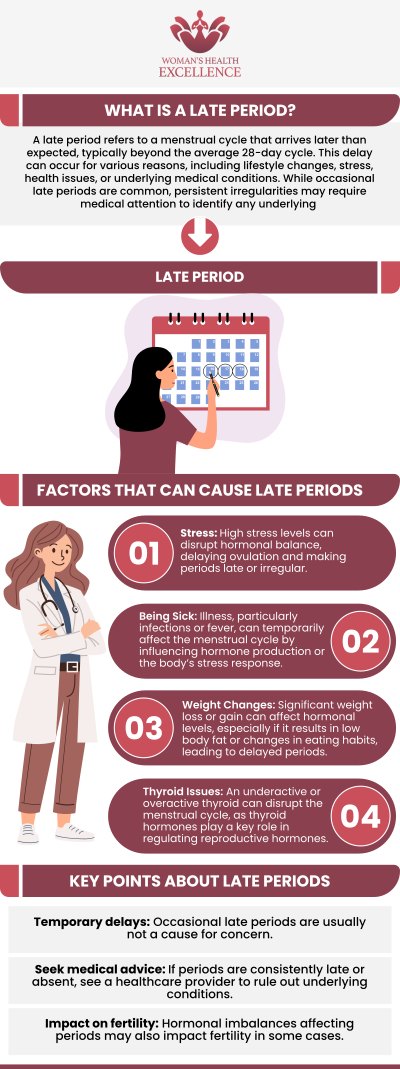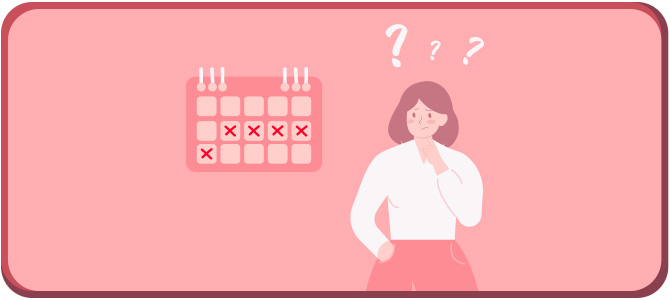Why Is My Period Late? Common Causes of Period Delay
Are you experiencing delayed periods? Dr. Prema Kothandaraman at the OB-GYN & Incontinence Center is committed to providing personalized care and effective solutions for your gynecological concerns. Common factors contributing to delayed periods include stress, hormonal imbalances, pregnancy, medications, and certain health conditions. For more information, contact us today or book an appointment online. We have convenient locations to serve you in Arcadia, and Glendale, CA.




Table of Contents:
Is it normal to have occasional delays in my menstrual cycle?
Could a late period be a sign of pregnancy?
How do birth control methods impact period regularity?
What role does age play in menstrual cycle irregularities?
At The OB-Gyn & Incontinence Center, we understand that every woman’s menstrual cycle is unique, with occasional delays often being a normal part of the cycle. For most women, the menstrual cycle, counted from the first day of one period to the first day of the next, typically ranges from 24 to 38 days. However, understanding the reasons behind these delays and when to seek medical evaluation from our team can be essential for your overall health.
Causes of Occasional Delays
Many factors, including stress, changes in weight, exercise habits, and certain medical conditions, can cause menstrual irregularities like delayed or missed periods. The skilled team at The OB-Gyn & Incontinence Center has the expertise to identify these causes, which might involve the following:
• Lifestyle factors: Changes in sleep patterns and travel can disrupt your cycle.
• Medications: Certain medications, including birth control pills, antidepressants, and others, can suppress ovulation and cause delayed periods.
• Pregnancy: The most common cause of a missed period. If you might be pregnant, take a pregnancy test and consult our team.
• Age-related changes: As a woman approaches menopause, her menstrual cycles may become irregular. Similarly, adolescents who’ve just begun menstruating will often have irregular periods for a year or so after their first period.
• Medical conditions: Underlying conditions, such as uterine fibroids or endometriosis, can interfere with menstrual regularity.
When to Seek Medical Evaluation
While occasional delays are normal, you should consider scheduling an appointment with The OB-Gyn & Incontinence Center if:
• Delays are frequent: You consistently have irregular periods, or your cycle length varies greatly from month to month.
• Unable to conceive: If you are attempting to conceive and haven’t had a period in a long time.
• Over age 40: Irregular periods in this age group could be a sign of perimenopause or other hormonal changes.
At The OB-Gyn & Incontinence Center, we understand that a late period can be a source of concern for women of reproductive age. It could potentially indicate pregnancy, as one of the earliest signs is amenorrhea, or the absence of menstruation. This happens when the body produces a hormone called human chorionic gonadotropin (hCG). This hormone signals the body to halt the menstrual cycle, allowing the pregnancy to develop. Some may also experience implantation bleeding, which can sometimes be mistaken for a period.
However, we recognize that a late period does not always mean pregnancy. There are numerous other potential causes, including stress, significant changes in weight, hormonal imbalances caused by conditions like polycystic ovary syndrome (PCOS) or thyroid disorders, certain medications, including birth control pills, and other underlying medical conditions, such as uterine fibroids or endometriosis.
If you suspect you might be pregnant due to a late period, we recommend taking a home pregnancy test, which is designed to detect hCG in the urine. If the test is positive or if you continue to miss your period, we recommend scheduling an appointment with one of our experienced healthcare providers for confirmation and to initiate prenatal care if you are indeed pregnant.
The OB-Gyn & Incontinence Center focuses on understanding delayed periods and ensuring appropriate diagnosis and management. If experiencing a late period, consult a healthcare professional and consider additional tests like blood tests or ultrasound examinations.
Many women choose hormonal birth control methods, which include pills, patches, vaginal rings, injections, and implants. By altering the hormonal balance in your body, these methods can lead to changes in your menstrual cycle. This approach can lead to more predictable menstrual cycles, reduced menstrual flow, or even the cessation of menstruation in certain cases.
One common form of hormonal birth control is oral contraceptive pills, which often result in shorter, lighter, and more predictable menstrual cycles. These pills contain both estrogen and progestin that work together to prevent ovulation and make the cervical mucus inhospitable to sperm. The hormonal regulation offered by these pills can help establish a regular menstrual cycle.
Hormonal IUDs and birth control implants can also alter period regularity by releasing progestin into your body. This can thin the uterine lining and decrease or stop menstrual bleeding over time. However, these methods can also lead to irregular spotting or heavier periods in some women, particularly during the initial months of use.
Non-hormonal methods, such as the copper IUD, condoms, and diaphragms, generally do not impact period regularity as they do not interfere with your natural hormonal cycle. However, the copper IUD can result in heavier, longer, and more painful periods for some women.
Menstruation commonly starts during adolescence, usually between the ages of 10 and 16, and continues until menopause, generally around 45 to 55 years. During these phases, the body goes through numerous hormonal changes that may lead to irregular cycles. This can include inconsistent periods, varying in duration, frequency, and flow. While these irregularities are normal, they often resolve as the hormonal system matures.
As women approach menopause, hormonal fluctuations can cause irregularities in the menstrual cycle again. Lower estrogen levels lead to less frequent ovulation, causing irregular or missed periods. Some women may also experience changes in the flow of their period or occasional irregular bleeding due to these hormonal changes.
Moreover, age can indirectly influence menstrual irregularities as women are more likely to develop certain health conditions like polycystic ovary syndrome (PCOS) or uterine fibroids that can alter menstrual patterns. Lifestyle factors that often change as a woman ages, such as stress levels, diet, exercise habits, and weight, can also impact menstrual regularity.
The OB-Gyn & Incontinence Center provides support for managing irregular cycles caused by hormonal imbalances, thyroid disorders, or certain medications. If you notice sudden or drastic changes, schedule an appointment with healthcare providers. For more information, contact us today or book an appointment online. We have convenient locations to serve you in Arcadia, and Glendale, CA. We serve patients from Arcadia CA, Glendale CA, Monrovia CA, Pasadena CA, Los Angeles CA, Burbank CA, and surrounding areas.


Additional Services You May Need
▸ Urogynecology
▸ Minimally Invasive Gynecology
▸ Monalisa & Medical Aesthetics
▸ Bioidentical Hormone Replacement Therapy
▸ Urinary Incontinence
▸ Pelvic Organ Prolapse
▸ Painful Bladder
▸ Urinary Tract Infection
▸ Genitourinary Syndrome of Menopause
▸ Female Sexual Dysfunction
▸ Urinary Retention
▸ Vaginal Laxity & Prolapse
▸ Postpartum Pelvic Floor Problems
▸ PCOD
▸ Bladder Prolapse Repair
▸ Urgent PC
▸ Fibroids
▸ Excessive Bleeding
▸ Pelvic Pain
▸ Birth Control & IUD
▸ Vaginal & Pelvic Infection
▸ Monalisa Touch
▸ STD
▸ TempsureVitalia
▸ Biote Pellet Therapy
▸ Topical BHRT
▸ Flexsure
▸ Rectal Prolapse Repair
▸ Tempsure ENVI
▸ Minimally Invasive Pelvic Surgery for Incontinence



